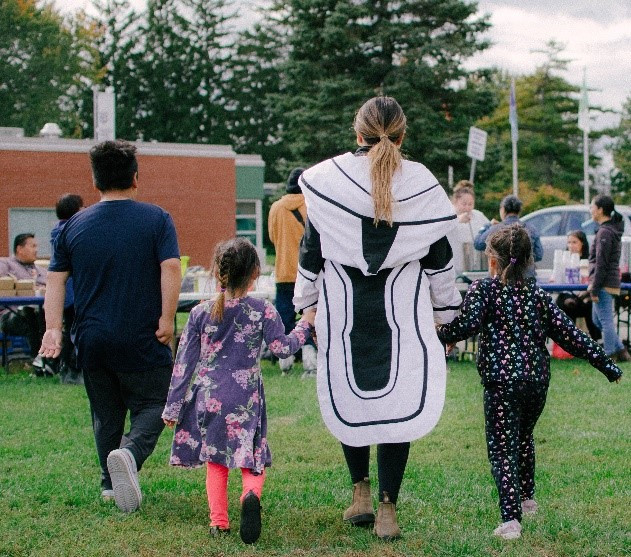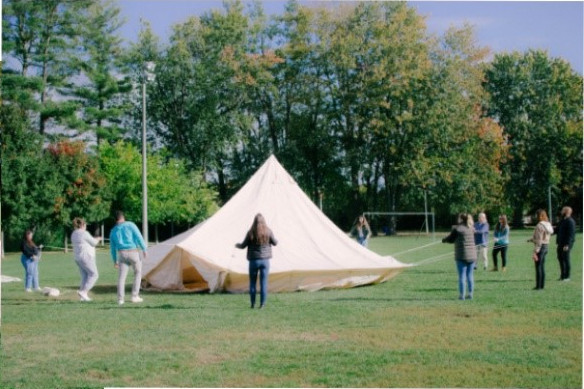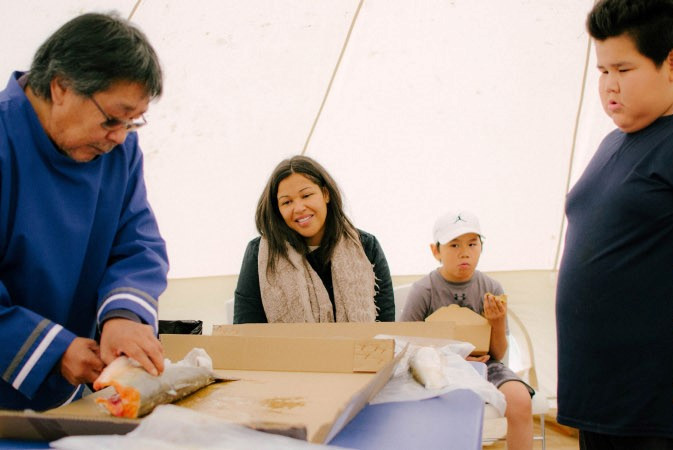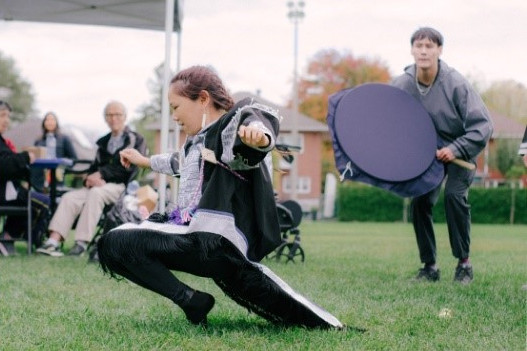Last Fall, the O Division Indigenous Liaison (ILU) Unit in collaboration with Tungasuvvingat Inuit, held the first Inuit Qaujimajatuqangit (IQ) Day in the Ottawa region. This day, intended as a learning experience for RCMP employees and an opportunity to build our relationship with the Inuit communities, was a great success. Cst. Kipanik Eegeesiak, ILU for the Ottawa region, represented O Division RCMP at this event, and shared his experiences having been born and raised in Iqaluit, Nunavut.
An Inuit IQ day is a celebration in Inuit communities that focuses on the traditional knowledge, skills, and values passed down through generations. The day included activities such as cultural teaching, games, food preparation and demonstrations of traditional practices to promote Inuit cultural heritage.
The day began with the setup of the tent, a considerable challenge that required the collaboration of several people!
The Inuit tent is an essential aspect of Inuit life, providing not only shelter but also a symbol of cultural identity. Usually made of animal skins or canvas, they are designed to be portable, allowing nomadic Inuit communities to move with the seasons as they follow hunting and fishing patterns. They hold cultural significance as symbols of ingenuity, resourcefulness, and adaptability. The knowledge and skills required to construct and maintain these shelters have been passed down through generations.
Elders hold significant importance in the Inuit community, serving as cultural repositories, wisdom keepers, and sources of guidance. They play vital roles in passing down traditional knowledge, storytelling, and maintaining community cohesion.
David Erkloo was present to transfer his knowledge on the special technique used to prepare the Artic Char in order to get it ready to dry. Dried fish, also known as "pitsik", is a traditional food preparation method where fish is dried to preserve it for long periods. Dried fish can be consumed as is or rehydrated and cooked in various dishes.
Aigah Attagutsiak explained the importance of Oil lamp tool. Oil lamps, known as Qulliq in Inuktitut, are crucial tools for the Inuit. These lamps provide light and heat, vital for survival in the Arctic's harsh conditions. They also hold cultural significance as a symbol of warmth, community, and the traditional way of life.
Students from the Nunavut Sivuniksavut (NS) school attended the IQ day to share their Inuit knowledge, but also to learn from the community. NS school is a post-secondary school, located in Ottawa, that provides Inuit youth with a unique learning experience that combines college-level academic studies with the development of Inuit cultural knowledge, communication skills, as well as independent living and leadership skills. Students were more than happy to demonstrate their knowledge of throat signing, drum dancing, juggling and also participate in the Inuit games.
In the Inuit tradition, each Inuit game has a practical goal: strength, agility, coordination, endurance and practical skill development. Games help members of the community to hone the hunting and survival skills that they will need in order to thrive in their Arctic landscape and are played throughout life to keep skills sharp.
They still play a vital role in today's society. Athletes continue to practice, teach and compete in Inuit games to keep the memory of their ancestors alive and to ensure the survival of Inuit culture and tradition.
To learn more about Inuit Games, please visit: https://inuuqatigiit.ca/inuit-games/.
Many women from the Inuit community wore this traditional garment on IQ Day, the Amauti.
The traditional Amauti is made of caribou and seal skin, which provide warmth, protection, and functionality in cold Arctic environments. They are tailored to the specific needs and activities of women in their traditional roles within Inuit society. For example, some garments may have built-in pouches or compartments for carrying essential items such as tools, food, or babies, allowing women to maintain mobility and functionality while performing daily tasks.
The Inuit garments are not just practical clothing items; they are also important cultural artifacts that embody the knowledge, skills, and values passed down through generations of Inuit people
.RCMP employees also had the privilege of learning how to cook a traditional Inuit recipe, the Caribou stew, with the precious help of Zippie Nochasak and Lily Amagoalik, Tungasuvvingat Inuit Culture Program Manager. The meal was then served and enjoyed by the guests on IQ Day.
Many thanks to the Inuit community for so generously sharing their knowledge and culture with us! A special thank you to Okalik Eegeesiak from NVision Insight Group Inc, and aunt of Cst. Kipanik Eegeesiak, for hosting this first IQ day in Ottawa. Finally, this event would not have been possible without the collaboration of RCMP National Youth Services (NYS), RCMP-Indigenous Collaboration, Co-Development and Accountability Unit (RICCA), RCMP Indigenous Liaison Unit and the Tungasuvvingat Inuit organization.
We are discussing the possibility of a second IQ day in the spring, stay tuned for more details!




